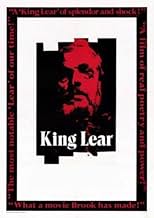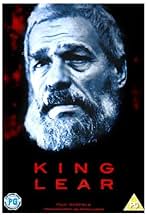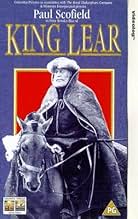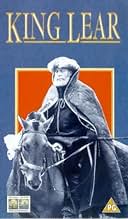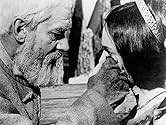अपनी भाषा में प्लॉट जोड़ेंKing Lear divides his kingdom among his daughters, giving great importance to their protestations of love for him. When Cordelia refuses to idly flatter the old man, he banishes her and turn... सभी पढ़ेंKing Lear divides his kingdom among his daughters, giving great importance to their protestations of love for him. When Cordelia refuses to idly flatter the old man, he banishes her and turns for support to his remaining daughters.King Lear divides his kingdom among his daughters, giving great importance to their protestations of love for him. When Cordelia refuses to idly flatter the old man, he banishes her and turns for support to his remaining daughters.
- निर्देशक
- लेखक
- स्टार
- पुरस्कार
- 2 जीत और कुल 1 नामांकन
फ़ीचर्ड समीक्षाएं
in a moment of irony that could occur only in cinema, the definitive version of Shakespeare's 'king Lear' is Kurosawa akira's 1985 'ran'. only Kurosawa - at the end of his own career and looking back at at a century of blindness socially and politically, that dragged his culture through the horrors of the Tojo regime and the second world war - could grasp the essential insight of Shakespeare's vision of political perversion arising from simple but fundamental personal mistakes in judgment.
brook, of course, doesn't go after that. in fact, the issues just noted have been missed just about entirely by every American and British version of the play i've seen, even Laurence Olivier's farewell performance on television just before he died.
so when we come to brook's film, we have to let go of the hope that this will be the 'ur-Lear' that we seem to have misplaced in the west ever since the Elizabethan era.
in fact, let's let go of Shakespeare completely, here - this is a peter brook film, and brook is actually after something fundamentally cinematic - but not necessarily Shakespearean.
brook's film is a relentless portrayal of the world turned upside down. the most memorable quality of the film - and it stuck to me for many years - is the camera work, that gets unsteadier and more rapidly cut as the film goes on, until the audience feels trapped inside a house in a hurricane - and one that's quickly falling apart.
to find some ground in this visual catastrophe, the audience will desperately grab onto Shakespeare's words or the fine performances by the wonderful cast - but be warned - that's not really going to help much, and it's not supposed to.
brook, who made his name by approaching theatrical stage performances in a rather daring visual style, clearly wanted to see how far he could push the medium - the audience will have to decide whether he's successful - but the effort itself is worthy of respect.
brook, of course, doesn't go after that. in fact, the issues just noted have been missed just about entirely by every American and British version of the play i've seen, even Laurence Olivier's farewell performance on television just before he died.
so when we come to brook's film, we have to let go of the hope that this will be the 'ur-Lear' that we seem to have misplaced in the west ever since the Elizabethan era.
in fact, let's let go of Shakespeare completely, here - this is a peter brook film, and brook is actually after something fundamentally cinematic - but not necessarily Shakespearean.
brook's film is a relentless portrayal of the world turned upside down. the most memorable quality of the film - and it stuck to me for many years - is the camera work, that gets unsteadier and more rapidly cut as the film goes on, until the audience feels trapped inside a house in a hurricane - and one that's quickly falling apart.
to find some ground in this visual catastrophe, the audience will desperately grab onto Shakespeare's words or the fine performances by the wonderful cast - but be warned - that's not really going to help much, and it's not supposed to.
brook, who made his name by approaching theatrical stage performances in a rather daring visual style, clearly wanted to see how far he could push the medium - the audience will have to decide whether he's successful - but the effort itself is worthy of respect.
As has happened so many times with the Oscars, another great film-actor-ensemble has been neglected. Recognised nearly universally as the ultimate test of an actor's craft, Paul Scofield as Lear in this 1971 version could be deified for his performance, even more complex than his Oscar-winning Thomas More in 1966's best pic "A Man For All Seasons". Viewing this film should be a prerequisite not just for R.A.D.A. acting students. Incorporating as he did the essence of Lear so organically, Scofield sadly was not even nominated, another nod to the lowest common denominator public taste. This review, nearly forty years after the pic's release, was an on-the-spot spontaneous impulse after yet another viewing of the film. People are afraid of Shakespeare(a.l.a. DeVere); don't be. All, but especially any pained by their own offspring, will turn away from the screen with much more than a penny's worth of thought and a rediscovery of the art of Paul Scofield and ensemble. It is a cliché, but they just don't make movies like this one anymore.
Peter Brook has the knack of making his stagings completely his own while at the same time enhancing the character of the play. Thus in "Carmen" he turns it into something of a chamber play, and here in King Lear he stresses the primitivism of the play turning into almost something like a documentary of the dark ages. In especially the first part including the storm he is entirely successful, in spite of the rather experimental expressionism,and the realism of the primitive middle age settings in a landscape of only moors and snows, not a tree in the whole film, is effectively impressing. The actors are superb throughout, and Paul Scofield renders a very interesting interpretation of the old man losing himself with occasional magnificent outbursts of powerful rage. The play is shortened, of course, you can't put all of a Shakespeare play into a film, (I believe the only successful attempt at that was Kenneth Branagh's "Hamlet" and very commendable as such,) while here the text abbreviations unfortunately suffer, the cuts being so obvious. Another flaw is that the articulation is not very good - it was fashionable in the end of the 60s to allow actors to talk on stage like as if they talked naturally, but theatre can't do without rhetoric; and especially with a language like this, which is the very essence of the play, you can't trifle with it, every word has to be pronounced distinctly, or it isn't Shakespeare.
Towards the end the direction gets more sloppy, the intensity loses its grip, while the apocalyptic battle scenes crown the direction. The austere scenery throughout I believe will be what you most will remember of this film adaptation, which couldn't be more impressive, while I think I would prefer the Russian version from about the same time as more convincingly Shakespearian. Since many years I have been waiting for an opportunity to see the Laurence Olivier version from 1983.
Towards the end the direction gets more sloppy, the intensity loses its grip, while the apocalyptic battle scenes crown the direction. The austere scenery throughout I believe will be what you most will remember of this film adaptation, which couldn't be more impressive, while I think I would prefer the Russian version from about the same time as more convincingly Shakespearian. Since many years I have been waiting for an opportunity to see the Laurence Olivier version from 1983.
"King Lear" is not one of my favourite Shakespeare plays (sacrilege indeed!) but I must say I find this film version immensely impressive and the best film version of Shakespeare I have seen.
The key to this is the direction of Peter Brook. Unquestionably this is an "arty" avant-garde production that has echoes of Bergman and Beckett as other reviewers have noted. For me this works extremely well. The choice of a barren Danish landscape in winter, the use of black and white, and unusual decision to eschew music all contribute to a very dark and bleak atmosphere. The director keeps viewers on their toes and presents a despairing tragedy.
There is nothing theatrical about this - quite rightly as this is a film version. The performances are restrained and measured. The acting is very strong - Patrick Magee particularly stands out as a very menacing Cornwall while Susan Engel and Irene Worth are fine as the manipulative elder sisters.
My only real reservation is that the climax of the film is rather rushed, with the numerous deaths needing a little more reflection. The suicide of Goneril is though extremely powerful. Lear's death is always poignant but the direction of it doesn't work completely.
Opinions are very mixed on this film but I certainly think it deserves attention. It would especially appeal to followers of Bergman and anyone who is struck by a dark tale.
The key to this is the direction of Peter Brook. Unquestionably this is an "arty" avant-garde production that has echoes of Bergman and Beckett as other reviewers have noted. For me this works extremely well. The choice of a barren Danish landscape in winter, the use of black and white, and unusual decision to eschew music all contribute to a very dark and bleak atmosphere. The director keeps viewers on their toes and presents a despairing tragedy.
There is nothing theatrical about this - quite rightly as this is a film version. The performances are restrained and measured. The acting is very strong - Patrick Magee particularly stands out as a very menacing Cornwall while Susan Engel and Irene Worth are fine as the manipulative elder sisters.
My only real reservation is that the climax of the film is rather rushed, with the numerous deaths needing a little more reflection. The suicide of Goneril is though extremely powerful. Lear's death is always poignant but the direction of it doesn't work completely.
Opinions are very mixed on this film but I certainly think it deserves attention. It would especially appeal to followers of Bergman and anyone who is struck by a dark tale.
Peter Brook's film is a very bleak and barbaric interpretation of King Lear. He does a great job directing and whilst some of his experimentation doesn't pay off (such as very strange zooming with Kent at the beginning), when it does pay off it is fantastic (such as Lear's monologues)
क्या आपको पता है
- ट्रिवियाBrook based this production on ideas expressed by Polish theater critic Jan Kott in the book "Shakespeare, Our Contemporary".
- क्रेज़ी क्रेडिटNot only is there no music in the film, but there are no "ambient sounds" at all during the opening credits, giving the impression that they were filmed using no soundtrack whatsoever.
- कनेक्शनFeatured in Shakespeare: Rise of a Genius: एपिसोड #1.3 (2023)
टॉप पसंद
रेटिंग देने के लिए साइन-इन करें और वैयक्तिकृत सुझावों के लिए वॉचलिस्ट करें
- How long is King Lear?Alexa द्वारा संचालित
विवरण
- चलने की अवधि2 घंटे 17 मिनट
- रंग
- ध्वनि मिश्रण
- पक्ष अनुपात
- 1.66 : 1
इस पेज में योगदान दें
किसी बदलाव का सुझाव दें या अनुपलब्ध कॉन्टेंट जोड़ें


